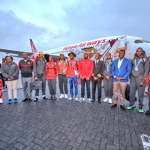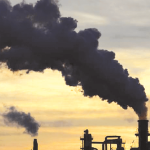Senegalese commuters eager to catch up on the news during their morning commute were left disappointed on Tuesday as most national newspapers chose not to publish in protest against what they perceive as a decline in media freedom under the new government.
The local Council of Press Distributors and Publishers (CDEPS) described the day as “one of the darkest in the history of the media.”
The council accuses the government, led by former opposition politicians, of freezing the bank accounts of media companies and seizing their equipment over alleged tax non-payment. Government officials defend this crackdown, stating it is aimed at curbing practices that lead to financial embezzlement and mismanagement within the media industry.
President Bassirou Diomaye Faye took office in March after winning against the ruling coalition’s candidate in elections. His ascent followed significant protests by the opposition, demanding elections that then-President Macky Sall had postponed, which critics viewed as an attempt to cling to power.
As part of Tuesday’s media blackout, newspapers were displayed on newsstands with blank pages, featuring only a black cover with the words “journée sans presse” (French for “day without press”) and an image of three raised fists holding a pencil.
Not all publications participated in the protest, with private outlet Wal Fadjri labeling the blackout an “ugly scar on the cheek of our beautiful democracy.
” While acknowledging the press is facing a “crisis,” Wal Fadjri argued that a blackout should be a last resort, as it deprives readers of their right to information.
Most radio stations did not join the boycott, though two popular private stations opted to play music instead of airing news. Private television channels like TFM (owned by Grammy-winning singer Youssou N’Dour), ITV, and 7 TV continued to broadcast news while demonstrating their support for the protest by displaying its slogan and image.
Concerns about potential media restrictions under Mr. Faye’s government surfaced a few months ago. Prime Minister Ousmane Sonko faced backlash from media professionals in June after warning that the government would no longer tolerate “falsehoods” from journalists, whom he claimed were enjoying “too much impunity.”
Mr. Sonko, who was once the public face of the opposition, was prohibited from running for the presidency but later supported Mr. Faye. Both had been imprisoned under the previous government and vowed to combat corruption and enhance democracy in Senegal.
Between 2021 and 2024, Senegal dropped from 49th to 94th place on Reporters Without Borders’ world press freedom index. The rights organization recently called on Senegal’s new president to take measures to promote press freedom following years of “arrests and attacks on journalists, media closures, and arbitrary Internet shutdowns” under Mr. Sall.



